Data
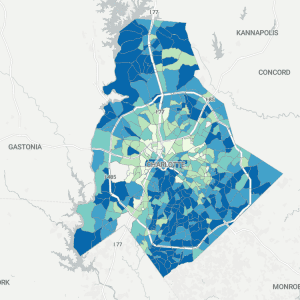
Explore new data about Charlotte via interactive maps
By Katie Zager
The Quality of Life Explorer — Charlotte-Mecklenburg’s source for more than 80 interactively mapped variables about the economy, environment, demographics and more — has been updated with new information allowing you to explore our community […]
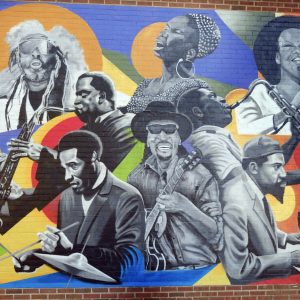
Survey sheds light on the future of Charlotte’s creative community
When it comes to the creative scene, Charlotte isn’t often mentioned in the same breath with peer cities like Austin or Nashville. After all, the city’s unofficial tagline is “Banktown,” not something like “Music City” or “Keep Austin Weird.” But Charlotte has a thriving creative community. And a new survey by the UNC Charlotte Urban […]

Using integrated data to center racial equity in local violence prevention work
Violence impacts all of Charlotte-Mecklenburg, but the toll doesn’t fall equally across members of our community. There are pronounced disparities along racial lines. A new, data-focused learning community will help local leaders across sectors find collaborative solutions to prevent and address violence in Charlotte and Mecklenburg County. Housed at the University of Pennsylvania, Actionable Intelligence […]

Mapping unequal health care access in Charlotte
Your access to medicine, lifesaving COVID-19 vaccines and other pharmacy services might depend on what part of town you live in. The Urban Institute recently updated the Quality of Life Explorer data maps to include several new metrics, one of which is particularly relevant as we enter year three of the global pandemic. “Proximity to […]
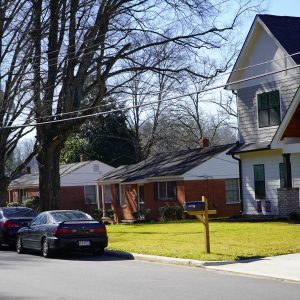
Explore local housing data with new interactive maps
We often paint Charlotte’s housing market in broad strokes: rising prices, bidding wars and gentrification reshaping neighborhoods. Updated data on the Charlotte/Mecklenburg Quality of Life Explorer lets you can dig deeper into the story told by those aggregate numbers. Charlotte’s neighborhoods are starkly different when it comes to characteristics such as what percentage of homes […]
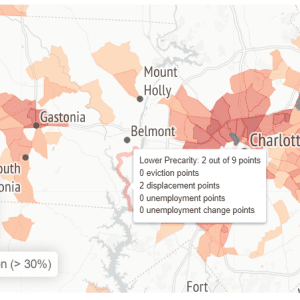
Explore these data sources to learn more about Charlotte
Charlotte is a fast-growing city where the skyline changes by the month and neighborhoods are reshaped at a disorienting pace. But there are a multitude of data sources to help you understand the city and your community. You can start with interactive maps like the Quality of Life Explorer (produced by the Urban Institute in […]
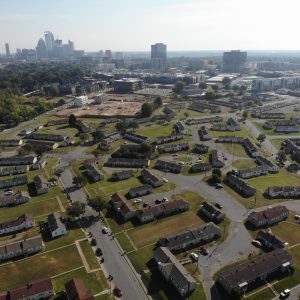
Examining housing needs at Brookhill Village in the event of redevelopment
In 2020, Lookout Housing Ventures proposed a redevelopment plan for Brookhill Village, a 36-acre naturally occurring affordable housing development near the intersection of Remount Road and South Boulevard. Although the proposed development has not moved forward, the approximately 120 households of Brookhill Village may be at risk of displacement if Brookhill Village were to be […]

What does the ‘Great Resignation’ mean for Charlotte?
More people than ever are voluntarily leaving their jobs. This phenomenon, known as the Great Resignation, is happening in nearly every employment sector and across a broad range of income levels. Fueled by the pandemic, changes in how we work, increasing work demands, other opportunities and more, workers of all types are looking for a […]
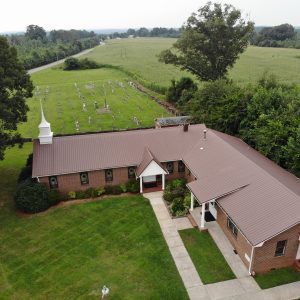
An ‘economic halo’ for rural churches in North Carolina
In small towns across North Carolina, churches function as more than places of fellowship and gathering for people — they’re also de facto economic engines. [Read the full report: ‘The Economic Halo Effect’] That’s one of the key findings of a new research report by the UNC Charlotte Urban Institute, in partnership with The Duke […]
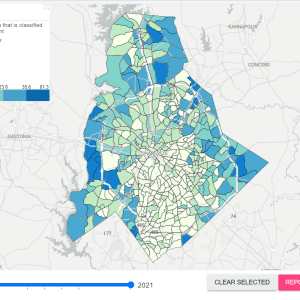
Explore everything from residential segregation to how much trash you generate with new maps
Which parts of Charlotte use the most water? Where is our growth eating up whatever vacant land is left in Mecklenburg County? Where are the racial, economic and other dividing lines that crisscross our community? You can answer these questions and more with the updated Quality of Life Explorer maps published online today. A joint […]